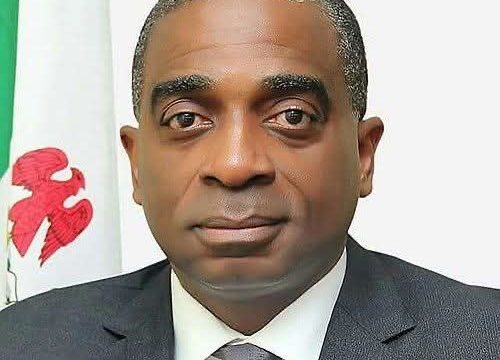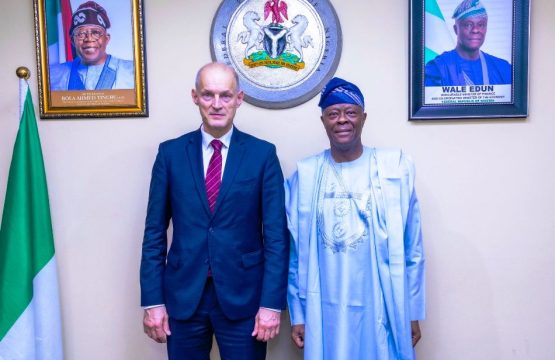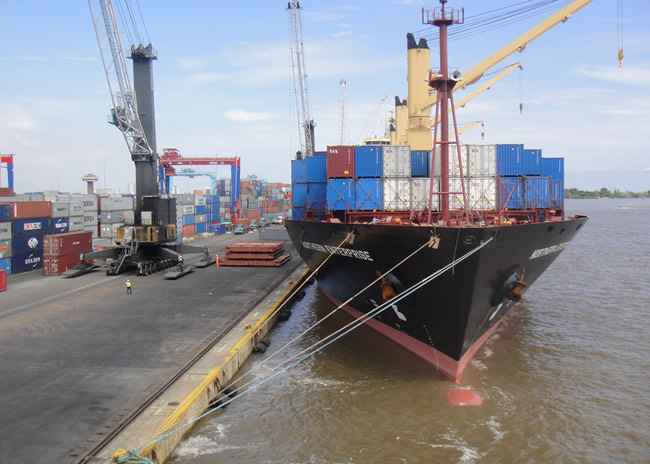▪︎President Donald Trump signs an executive order as he attends an indoor Presidential Inauguration parade event at Capital One Arena, Jan. 20, 2025, in Washington. Credit: VOAnews.
President Donald Trump began his second term in office on Monday , as the 47th President of the United States of America.
He got down to work by signing some executive orders part of which was his administration’s trade policies geared towards protectionism of American industries.
Trump is particularly seeking to turnaround trade deficits by leveraging these tariffs to negotiate better trade deals, particularly with China, Canada, and Mexico, whatever it takes.
“We’re going to make it fair,” he had said during a campaign. In an interview with Western TV, he declared,
“We’ll do 60 percent, we’ll do 100 percent,” he threatened. Implications for global trade .
BussinessDay, a Nigerian newspaper, reports that Trump’s trade policies are poised to ripple through global markets.
His administration’s emphasis on protectionism is likely to lead to higher tariffs and intensified trade tensions, particularly with geopolitical adversaries such as China and trading partners like Canada, the EU, and Mexico.
According to the United Nations Trade and Development (UNCTAD), global trade saw modest growth of 3.4 percent in 2024 following a sluggish 0.9 percent growth in 2023.
However, the projected growth rate of 3.2 percent in 2025 faces significant uncertainty as trade tensions escalate and restrictive policies disrupt cross-border supply chains.
“Trade tensions between China, the United States, and the European Union have intensified,” the UN reported, warning of possible retaliatory actions.
These measures, coupled with Trump’s tariffs, could create a less predictable trade environment, discouraging investments and dampening global economic growth.
The proposed tariffs, particularly on critical sectors like energy and defence, could significantly alter international trade dynamics.
Peter Navarro, Trump’s Trade Adviser, also emphasised the potential domestic benefits. “The Trump tariffs will make America and American manufacturing great again.”
However, the broader implications suggest heightened costs for global exporters and disruptions to established supply chains.
Trump’s inward-looking industrial policies and the global push for environmentally friendly manufacturing could challenge key Nigerian industries, such as oil and agriculture, where compliance with new standards may become costlier.
Implications for Nigeria
For Nigeria, Trump’s aggressive trade policies could present both challenges and opportunities. At $3.4 billion in 2022, Nigeria remains the second-largest U.S. export destination in Sub-Saharan Africa, with a trade deficit of $177 million for the U.S.
Trump’s proposed tariffs could directly impact Nigerian exports, particularly petroleum products, by raising costs and potentially reducing demand in the U.S.
Moreover, Trump’s inward-looking industrial policies and the global push for environmentally friendly manufacturing could challenge key Nigerian industries, such as oil and agriculture, where compliance with new standards may become costlier.
The UN warns that restrictive trade measures could stifle growth in strategic sectors crucial to Nigeria’s economy.
The potential appreciation of the U.S. dollar, driven by geopolitical tensions, may further complicate Nigeria’s trade landscape.
Given that most of Nigeria’s international transactions are dollar-denominated, any fluctuations in the dollar’s value could influence the country’s trade forecasts. Alan
Beattie, a senior trade writer, noted that while protectionist measures in the U.S. can disrupt global trade, they also create openings for countries willing to act swiftly.
For instance, the recent EU-Mexico update to their preferential trade agreement (PTA) and the restart of EU-Malaysia trade talks show that countries targeted by Trump’s trade policies, like Mexico, are already diversifying their export markets.
Beattie remarked, “This underlines that exporters have other options to the U.S.”
For Nigeria, this presents an opportunity, as Nigerian exporters could pivot toward markets less affected by U.S. tariffs, particularly in Europe and Asia.
Diversifying trade partners and leveraging frameworks like the African Continental Free Trade Area (AfCFTA) can help insulate the Nigerian economy from shocks caused by U.S. policies.
However, exporters may face tougher competition as cautious buyers limit spending, requiring Nigerian businesses to diversify their offerings or seek new markets to remain competitive.▪︎










